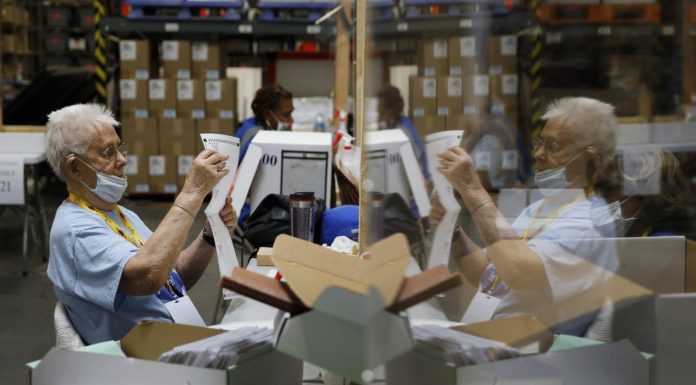(Headline USA) As President Donald Trump’s reelection campaign challenged Nevada‘s new voting law in court, the president and Republicans argued the rules would facilitate fraud and illegal voting.
Chief among their criticisms was a provision allowing “ballot harvesting.”
The Nevada lawsuit highlighted a practice that has long fueled Republicans’ suspicions about mail-in voting.
The rule permitting a third party to collect and return multiple ballots remains a source of partisan dispute.
Those fights are likely to continue up to Election Day as states adjust their laws for the pandemic.
Despite largely supporting the effort in places like California, Democrats have disingenuously opposed it in the past when the outcome favors Republicans.
One of the recent instances of alleged fraud related to ballot collection happened in North Carolina in 2018, resulting in a congressional election being overturned after claims that an independent political operative working for Republican Mark Harris had introduced “taint” into the outcome.
More than half of states allow a third party to collect ballots although some rules restrict the people to relatives or other specific people instead of partisan activists who may be seeking to sway the outcome.
And political groups and campaigns from both parties have run ballot-collection programs aimed at boosting turnout and ensuring voters who are older, homebound, disabled, or live far from U.S. postal services can get their ballot returned.
“This is not new ground,” Nevada’s Democratic Assembly Speaker Jason Frierson said in a statement. “Allowing someone to assist a voter in turning in their ballot helps protect vulnerable populations, including our tribal and rural communities.”
However, the Nevada law seems mostly to be of concern in the counties surrounding Reno and Las Vegas, the only ones to back Hillary Clinton in 2016. Collectively, they won the state for Clinton.
During the recent primaries, Cook County officials in the area surrounding Sin City sent out thousands of ballots later returned as undeliverable wrong addresses. Others were discovered discarded on the street and in Dumpsters.
Trump and the GOP contend “ballot harvesting” opens the door for fraud and have fought to restrict it. This has escalated as states prepare for greater reliance on absentee voting or vote-by-mail amid COVID-19.
This year, Republicans and Democrats have squared off in lawsuits over the third-party collection of ballots in Pennsylvania, Florida and Minnesota.
In Wisconsin, a conservative law firm known as the Wisconsin Institute for Law and Liberty requested that election officials outlaw the process.
Though that state’s laws don’t specifically address “ballot harvesting,” officials said they weren’t aware of any efforts to systematically collect absentee ballots in the state and did not impose a rule prohibiting it.
The 9th U.S. Circuit Court of Appeals earlier this year struck down a 2016 law passed by Republicans in Arizona that made it a felony for someone besides a voter’s family member or caregiver to return an absentee ballot.
While the appeals court sided with Democrats who had sued to challenge the law, the ruling is on hold while the state’s Republican Attorney General Mark Brnovich appeals to the U.S. Supreme Court.
In the meantime, the ballot collection restriction remains in force for the 2020 election.
In Nevada, an easing of ballot collection rules was included in a new law that calls for automatically sending ballots to all active voters this November.
Trump’s reelection campaign, the Republican National Committee and Nevada GOP filed a lawsuit last week asking a judge to strike down the law.
The complaint makes a brief mention of “ballot harvesting,” alleging without supporting evidence that it is among changes that “facilitate fraud and other illegitimate voting practices.”
Nevada’s Democratic attorney general asked a judge this past week to dismiss the lawsuit. A hearing has not yet been held.
Nevada is among 26 other states allowing voters to more broadly designate someone to drop off their ballot. About a dozen of those states have imposed limits on how many ballots a person can submit. Minnesota limits a person to collecting and returning three ballots, for example.
California since 2016 has allowed for someone to collect an unlimited number of ballots from voters, though it does bar someone from being paid based on how many ballots they return.
California’s law became the source of controversy and GOP criticism after Democrats used the practice to their advantage in 2018, flipping Republican-held congressional seats after a flood absentee ballots came in before the deadline and were counted after Election Day.
Nevada’s law does not include limits on how many ballots can be collected or restrictions on payment. It does allow someone to be charged with a felony for blocking the ballot from being submitted or failing to return it after being entrusted to do so.
In addition to expanding ballot collection, Nevada’s law also allows voters who are over 65, have a disability or are unable to read or write to have someone assist them in physically marking their ballot. Those provisions have also drawn criticism from Trump.
Nevada requires anyone assisting a voter in physically marking a ballot to include a written statement with the name, address and signature of the person who assisted the voter.
Adapted from reporting by the Associated Press

